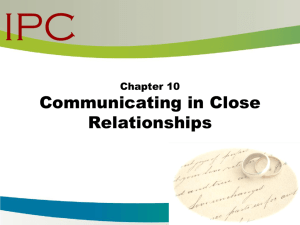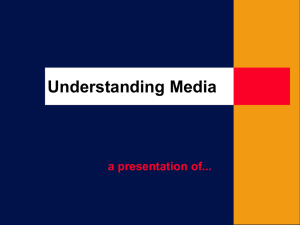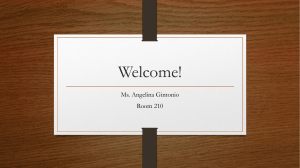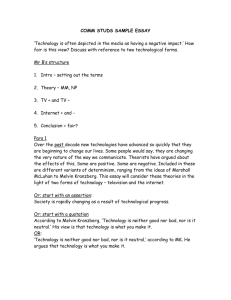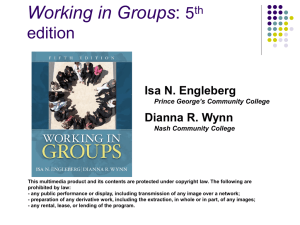The Medium is the Trivium Laura Trujillo Liñán Abstract
advertisement
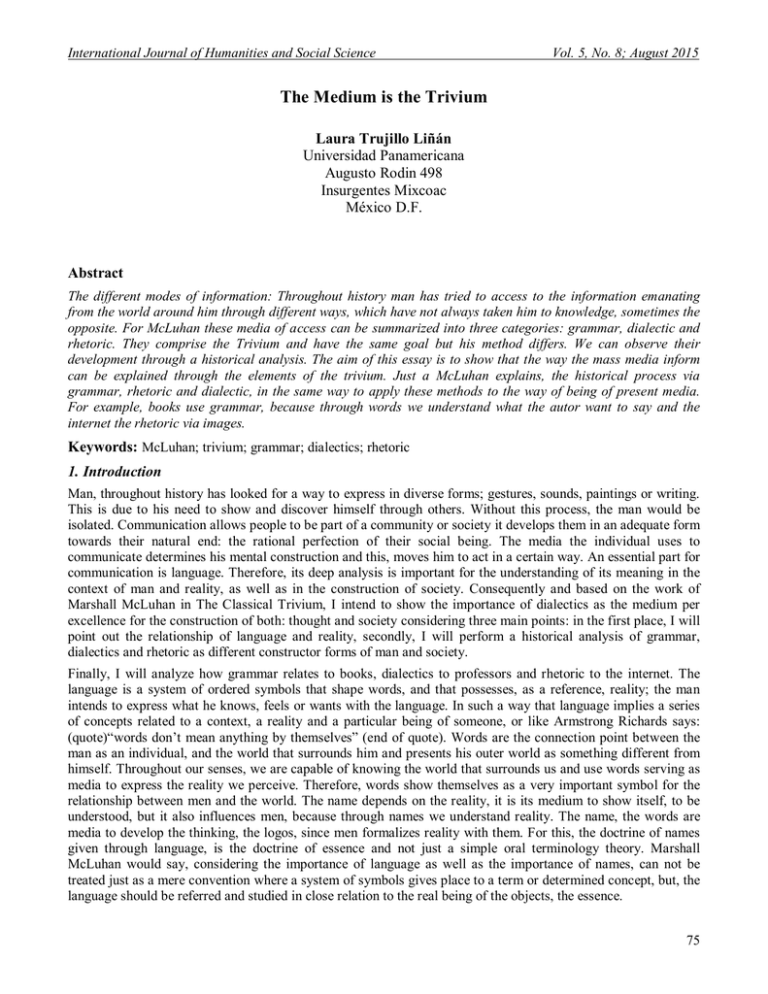
International Journal of Humanities and Social Science Vol. 5, No. 8; August 2015 The Medium is the Trivium Laura Trujillo Liñán Universidad Panamericana Augusto Rodin 498 Insurgentes Mixcoac México D.F. Abstract The different modes of information: Throughout history man has tried to access to the information emanating from the world around him through different ways, which have not always taken him to knowledge, sometimes the opposite. For McLuhan these media of access can be summarized into three categories: grammar, dialectic and rhetoric. They comprise the Trivium and have the same goal but his method differs. We can observe their development through a historical analysis. The aim of this essay is to show that the way the mass media inform can be explained through the elements of the trivium. Just a McLuhan explains, the historical process via grammar, rhetoric and dialectic, in the same way to apply these methods to the way of being of present media. For example, books use grammar, because through words we understand what the autor want to say and the internet the rhetoric via images. Keywords: McLuhan; trivium; grammar; dialectics; rhetoric 1. Introduction Man, throughout history has looked for a way to express in diverse forms; gestures, sounds, paintings or writing. This is due to his need to show and discover himself through others. Without this process, the man would be isolated. Communication allows people to be part of a community or society it develops them in an adequate form towards their natural end: the rational perfection of their social being. The media the individual uses to communicate determines his mental construction and this, moves him to act in a certain way. An essential part for communication is language. Therefore, its deep analysis is important for the understanding of its meaning in the context of man and reality, as well as in the construction of society. Consequently and based on the work of Marshall McLuhan in The Classical Trivium, I intend to show the importance of dialectics as the medium per excellence for the construction of both: thought and society considering three main points: in the first place, I will point out the relationship of language and reality, secondly, I will perform a historical analysis of grammar, dialectics and rhetoric as different constructor forms of man and society. Finally, I will analyze how grammar relates to books, dialectics to professors and rhetoric to the internet. The language is a system of ordered symbols that shape words, and that possesses, as a reference, reality; the man intends to express what he knows, feels or wants with the language. In such a way that language implies a series of concepts related to a context, a reality and a particular being of someone, or like Armstrong Richards says: (quote)“words don’t mean anything by themselves” (end of quote). Words are the connection point between the man as an individual, and the world that surrounds him and presents his outer world as something different from himself. Throughout our senses, we are capable of knowing the world that surrounds us and use words serving as media to express the reality we perceive. Therefore, words show themselves as a very important symbol for the relationship between men and the world. The name depends on the reality, it is its medium to show itself, to be understood, but it also influences men, because through names we understand reality. The name, the words are media to develop the thinking, the logos, since men formalizes reality with them. For this, the doctrine of names given through language, is the doctrine of essence and not just a simple oral terminology theory. Marshall McLuhan would say, considering the importance of language as well as the importance of names, can not be treated just as a mere convention where a system of symbols gives place to a term or determined concept, but, the language should be referred and studied in close relation to the real being of the objects, the essence. 75 ISSN 2220-8488 (Print), 2221-0989 (Online) ©Center for Promoting Ideas, USA www.ijhssnet.com Following McLuhan rule, the link between the world and men would not be corrupted with subjectivism or error, avoiding an inadequate behavior in an unknown world. We can affirm that the world is a book that should be read and be transmitted from the language shaped by names or words. This reading can be performed in three different forms, in accordance with McLuhan: firstly from grammar, understood as an allegoric exegesis of natural phenomena, as the way history begins, as well as the approach of men towards the knowledge of the world. The main exponents in the use of grammar as the medium to know the world are the pre-Socratics, who are, chronologically speaking, the Greek poets Homer and Hesiod (c. VIII and VII b. D. approx.), who m through poetry took their interpretation of the world to the ancient Greeks. Such exegesis, however, has points in favor and against, since it can be interpreted in diverse ways according to the era, beliefs, customs and trends. This is an advantage for poetry, for it is accessible and understandable for all people; however, there is room for subjectivity, because everyone can understand what they are pleased with, or it can lead us to a relativism, since reality in itself can be jeopardize, there would be no limit, as somehow we lose sight of the being, which is to say, the reality itself, the world, the objects; there wouldn't be possibility of any knowledge of nature. Under these circumstances and even the media we have to access it would be useless. The second type of authors who use grammar as a method to read the world, are philosophers as Thales of Miletus, Empedocles and stoics who explained the world throughout arguments with major intellectual force. This kind of reasoning, however, couldn't have been possible without the development of Homeric poems. Since this first approach, develops thinking in a way that a major abstraction level can be reached than the one used in the era of Homer and Hesiod. As an example, Thales argued that water was the beginning of all reality, because it is present in all beings as a constitutive element. Empedocles affirmed that with just one element the structure and the movement of reality could not be explained, for this reason he postulated that the beginning had four elements: water, air, fire and earth, since they constitute everything that surrounds us. Another example on this type of explanation is the one developed by the Stoics; for them, a "universal Reason” existed (Logos), that ordered the nature, as well as human reasoning, so this Logos, was the necessary condition for the comprehension of the world. An individual who can not have that matching, can not have the truth. We can affirm that with grammar think of a book-, knowledge petrifies, as Harold Innis in The Bias of Communication writes; it tends to the dogma, to the monopoly of information. If grammar helps with the transmission of knowledge and the greatest theories most of the time, it doesn’t lead to reflection. And this would be a restriction. A second way to make a reading of the world with language, according to McLuhan, has to do with dialectics, whose origin is found in the ancient Greek with Zeno of Elea, it proceeds from questions and answers, part of statements that are shown as true and seeks the essence of things through the reasoning. Dialectics, has to do with a movement starting from questions and answers, contrary to written words that tend to dogma; from dialectics we can also discover new truths and the oral discussion can involve people, besides, it moves away from a mechanized communication to approach to the humanization of information. In this sense, the work of the professor as a medium to reflection, and approach to the truth through dialogue, is our model of the dialectic.During the development of this second mode -Dialectics-, an important fact emerged, the upcoming of the Sophists whom tried to teach the public with the rhetorical method. Rhetoric sophists, start from arguments either they have the truth or not. Many times, they didn’t need to have a great scientific knowledge to win, but persuasion to convince an audience. Sometimes, rhetorical and dialectical methods tend to be mistaken, since both of them originate from arguments to develop a defense of a certain thesis. However, they are very different, the rhetoric seeks credibility by persuasion, not always the truth, and the dialectics reach the truth by means of questions and answers. To rhetoric, the word had a greater power, it did not depend on the reality anymore, but in some way the reality depended on it. Nevertheless, the philosophers contradicted this posture by pointing out, especially Plato and Aristotle, that the rhetorical was subordinated to dialectics, the base argument for this affirmation is that their technique is sustained by the reality and there is where the truth lies, not in the word that is changeable as the crowd of people who express it. Regarding dialectics and rhetoric, McLuhan mentions that “the history of the trivium is largely a history of the rivalry among them for ascendancy”. Nowadays, one of the media that uses these methods is the internet, based on persuasion using images, phrases and colors, it takes us wherever it wants, not necessarily with the best content. It is worrying to see how this type of modern communication as the internet, leads us to a suspension of judgment, there is no more reasoning, there is only an election coming from the persuasion not from the truth. 76 International Journal of Humanities and Social Science Vol. 5, No. 8; August 2015 If we agree knowledge, must go oriented towards the truth, to have a suitable knowledge of the reality, and thus to act consequently, and if we know that the access to the knowledge can occur by a lot of ways foreseen by McLuhan; it would be mandatory to ask ourselves which of the three media that we have mentioned before: grammar, dialectics or rhetoric, will be the one, that takes man to a greater intellectual development, so that knowing the truth he is capable of, create a criterion, that takes him to develop himself towards the rational perfection of its social being. In the first place with grammar, we mentioned that the book takes the man to the knowledge of concepts, theories, histories or myths. We affirmed, knowledge is petrified, lies down to the dogma, to the monopoly of information. Secondly, dialectics is represented by professors, who are a medium for reflection, an approach to the truth through dialogue. This method promotes a movement from questions to answers, this opposes to the dogma of the written word. Through dialectics, new truths can be discovered and it moves away from a mechanized communication to reach the humanization of the information. And finally, rhetoric, represented by the Internet, which persuades through different symbols, takes us to a suspension of the judgment, because there is no longer more reasoning. Although it is certain that we cannot limit the knowledge to a unique medium, it is possible to feed our thought through media, which develops our rational abilities in a better way, it is for that reason that the medium per excellence according to the analysis done by McLuhan in the Trivium, turn out to be the dialectic, whose model is the professor in or outside the classroom, because we must feed the thought with truths to promote the reflection of the man to form his criterion adequately. In another way, following the knowledge without critic, without reflection, can take us to a logicidium, to the death of logos, the death of reasoning, in 1 which the only victim is the quality of the intellect and therefore the society. So then, we have to go back to the classics, go back to the future. References GUILHERME M José, “El Logicidio Occidental” in Vuelta 149, april 7 1959, Mexico HERNÁNDEZ f. Juan Abelardo, La racionalidad en Marshall McLuhan y la escuela de Toronto, Universidad Panamericana, México 2004 HOMER, Iliad INNIS Harold, The Bias of Communication, University of Toronto Press, Toronto 1971 McLUHAN Marshall, The classical trívium: the place of Thomas Nashe in the learning of his time, Gingko Press, CA 2006 OGDEN, C.K.; RICHARDS, I. A. El significado del significado, Ed. Paidós, Buenos Aires, 1964 PLATO, Phaedo Republic VII, 532b 2 en SAYRE M. Kenneth, Plato´s Literary Garden, Notre Dame Indiana, 2002 http://plato.stanford.edu/entries/aristotle-rhetoric/#dialectic (accessed on 5 february 2011) TRUJILLO, Laura, El Hombre y sus Medios: Una Aproximación al Impacto Mediático de la Persona, Porrúa México 2014 77
